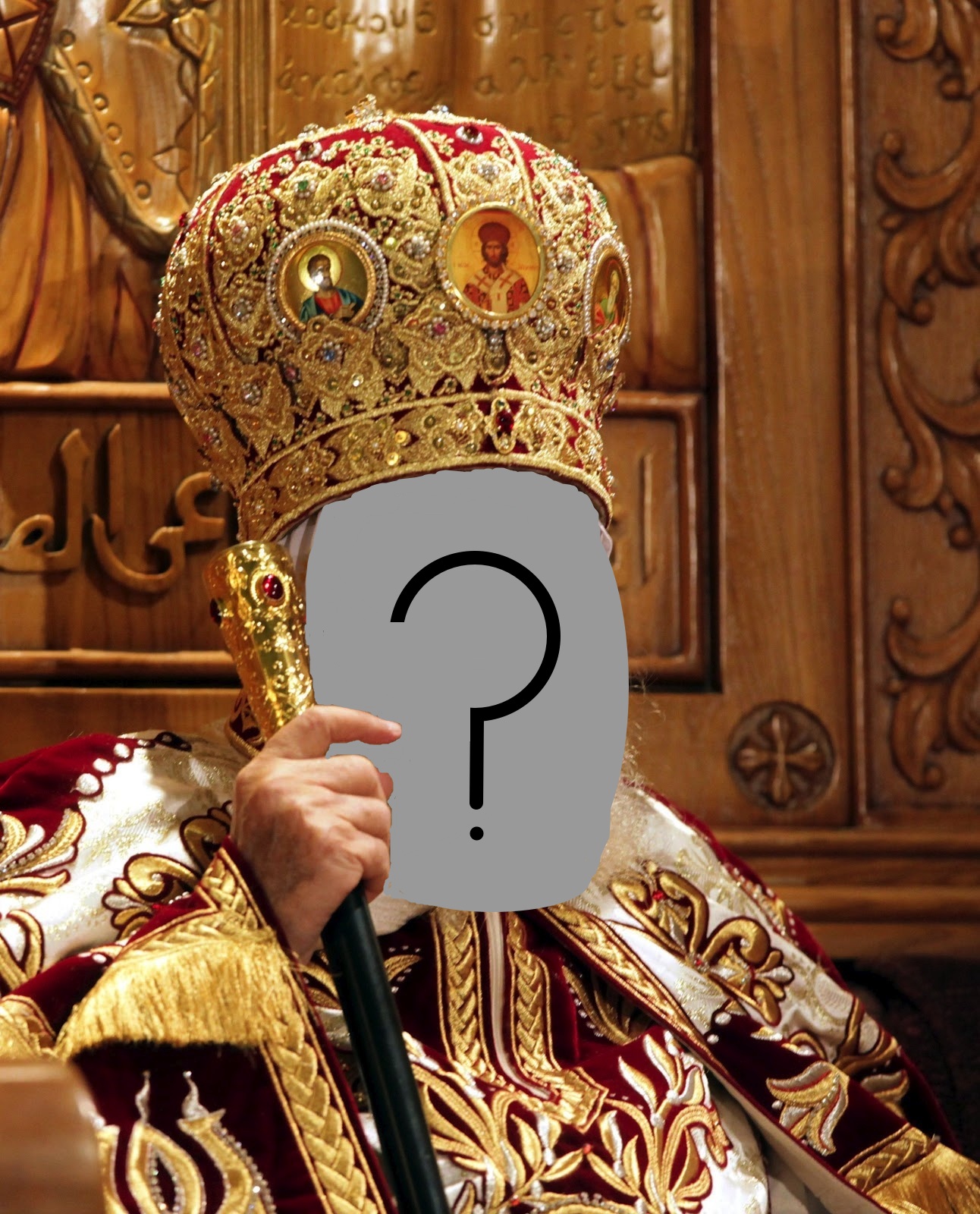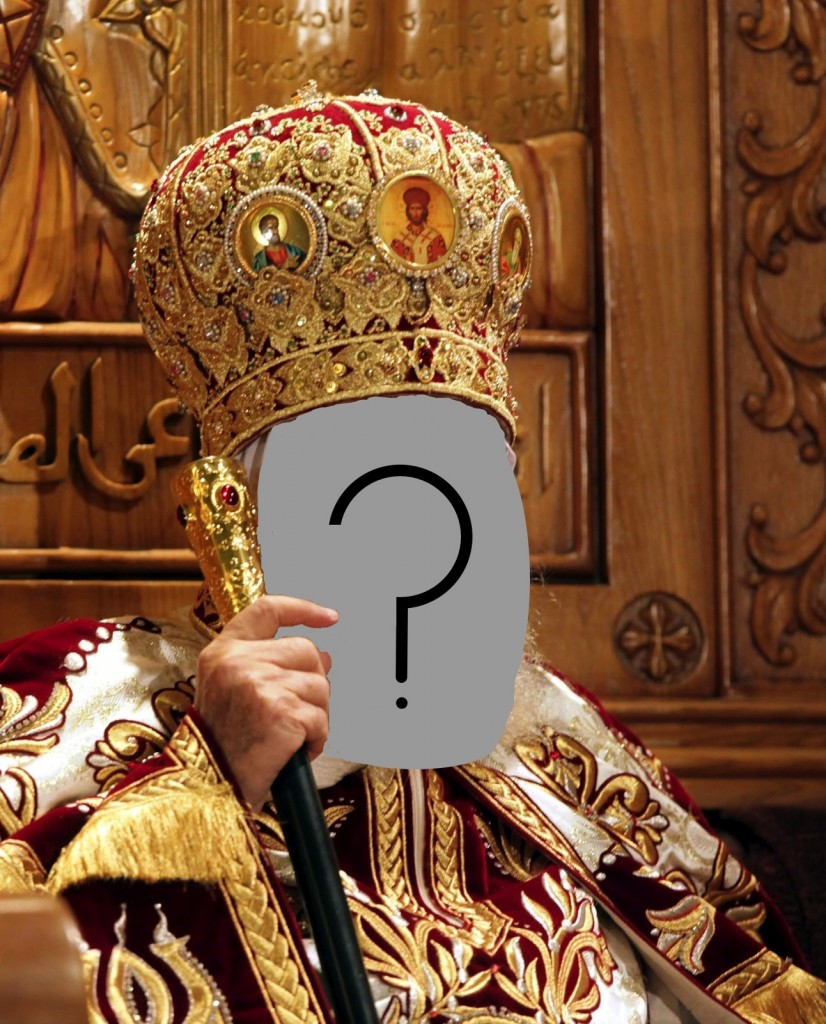Yesterday His Eminence Metropolitan Pachomius announced the final short list of candidates for the election to be held on November 24 to choose the 118th Pope of the See of Alexandria, the Patriarch of the Coptic Orthodox Church. The list of five candidates is:
- HG Bishop Raphael (General Bishop)
– responsible for central Cairo but also serves with HG Bishop Moussa in the Bishopric of Youth.- HG Bishop Tawadros (General Bishop)
– assistant to HE Metropolitan Pachomius in the diocese of Beheira, north-western Egypt.- Fr Raphael Ava Mina
– a disciple of the late Pope Kyrollos VI and Abba Mina Ava Mina, the late head of the Monastery of St Mina.- Fr Pachomius Elsouriany
– has served in Rome, Italy as a parish priest under HG Bishop Barnabas.- Fr Seraphim Elsouriany
– has served in Hawaii, USA as a parish priest under HG Bishop Serapion.
No doubt more biographical details will soon be released about each of the candidates. I have gleaned from various sources that the Electoral Committee comprised of nine bishops and nine lay members of the Community Council (Maglis el Milli) spent nine days deliberating in the desert monastery of St Bishoy in order to trim the original list of 17 nominees down to just five. They considered all the objections that had been submitted to them for consideration and gradually whittled down the list through a series of secret ballots. All this was supported by a general fast with many prayers and liturgies carried out by the whole body of Copts all over the world, praying for God to guide the process and those conducting it to make the best decision for the Church.
I think the fasting worked. There are a number of positive things about this shortlist that are worth noting. Firstly, it is reassuring to see that our monasteries are still capable of producing monks of a high spiritual calibre in this day and age where life has become so complicated and true ascetism so difficult. Secondly, it is encouraging for the younger generations in the Church to see that some of the candidates, especially HG Bishop Raphael, have a firm background in serving the youth, which means they should have a comprehensive knowledge of the needs of the youth and how best to meet them. The young have been a very high priority since the papacy of Pope Shenouda III who was himself a Sunday School servant in his younger days and whose experience with the young greatly influenced his direction as pope. Also encouraging is the fact that a number of the candidates have served in the west and should hopefully therefore possess a sound understanding of the unique challenges and needs of western Copts, a category that currently comprises roughly 10-15% of Copts in the world, and will only grow in the years to come.
I have been blessed with the opportunity of witnessing first hand the remarkable management skills of HE Metropolitan Pachomius, and indeed, the diplomacy, tact and wisdom he has applied to this very electoral process is a monument to those skills. Anyone who has served with him, as has HG Bishop Tawadros, would surely have absorbed some of these skills and wisdom and would bring a much needed set of talents to the leadership of a Church that is rapidly growing into a vast and varied international organisation. In a similar vein, the widely respected Fr Raphael Ava Mina brings to the table the deep spirituality he has imbibed from the modern thaumaturgus (miracle worker) Pope Kyrollos VI, whose living faith solved many a problem that human cleverness could not.
Finally, there are no diocesan bishops on this list, an issue I have discussed before on this blog. This will comfort the large proportion of the Church (including me) who objected to this innovation of the twentieth century and who felt that the tenures of the three patriarchs who were diocesan bishops (metropolitans to be specific) were a low point in the history of the Church. I still feel very strongly that we should at all costs preserve the principle of choosing a patriarch from among those who do not covet the position, even for “good” reasons. It is a principle that has stood the test of time and proved its worth over and over again. There are many Christians in other Churches who envy us this unique safeguard. By the grace of God, so far as I know, none of the candidates on this shortlist fall under the category of those who coveted the papacy.
Apparently, the Holy Synod has tasked the incoming Patriarch, whoever he is, with overseeing the writing of a new constitution for the process of electing a patriarch. The tense political situation in Egypt meant that the Church was unable to make any changes to the one currently in use, which was first drafted in the 1920s with minor revisions made in the 1950s. To amend it required Presidential permission, a tricky task in the current climate. But the world and the Church have changed significantly since this constitution was drafted, and a number of amendments are now pressing. For example, the stipulation that only Egyptian nationals can take part in the election process snubs the roughly two million Copts who now live outside Egypt and hold other citizenships, as well as the growing number of non-Egyptian Copts in Africa and other places. There are also outdated conditions relating to minimum incomes, social status and gender that need to change.
And there far more difficult tasks ahead for the next Pope. He will have thrust upon him a huge and complex burden of responsibility, one that no one in their right mind would dare to take up on their own initiative. The next few decades hold many difficult challenges for the Church and a firm and steady hand is required on the tiller. Among these challenges are the radical yet fluid changes occurring in post-revolutionary Egypt, the risks of growing Islamic fundamentalism and persecution of Christians in their own homeland, economic pressures on all Egyptians and the challenge of providing the poorest members of the community with even the most basic human needs like clean water, healthy food, employment, education and health care. In western countries we take it for granted that governments will guarantee their citizens these basic necessities of life, but in Egypt much of that load falls upon the Church.
And outside Egypt there are equally great challenges, albeit of a different nature. Material needs are not the issue here, but spiritual, intellectual and emotional. The pressures of atheism, secularism, addictions, sexual issues, rising divorce rates and materialism, to name a few, all make it harder for the average western Copt to live out their ancient Christian faith in the modern world. Add to this sensitive social issues like the role of women in the Church and ethical issues related to the technology of life (cloning, test tube babies, euthanasia) and you can see how complicated the coming years will be. What is more, as our Church begins to open up to the world and take on the divine commission to “preach to all nations”, the influx of a culturally diverse population of converts holds its own challenges. What is core faith and crucial to preserve, and what is merely cultural and ready to be abandoned for these converts?
Poverty is a problem our Church has dealt with for millennia, and we are quite good at it (in Egypt, at least) but the challenges in the west are for the most part new for our Church and we must learn quickly how to deal with them, developing new and innovative solutions that build on the foundation of our apostolic faith and tradition. This is no easy task for the new Pope, who, although he will doubtless have many willing helpers, will still need to find the wisdom and the grace to make the tough decisions that will certainly be required of him.
I think we need to start praying for this poor man from now, even though we do not yet know which of the five he is. Just pray with an <<insert name here>> tag in the text of your prayer.
Fr Ant

